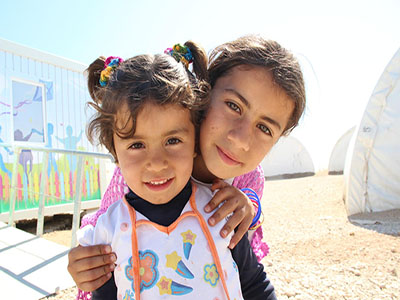Cover image: © UNICEF/UKLA2014-05008/Yurtsever - 9 year old Razan (right) with her little sister in Adana in Turkey.
This course explains what psychosocial support is, why it is important and what a holistic psychosocial support programme looks like. It further describes the ways that distress can manifest in children and identifies the different layers of a complete psychosocial support programme, and how psychosocial support can be integrated into UNICEF humanitarian response.
Learning objectives
At the end of this course, you will be able to:
- Define what psychosocial support is
- Explain why psychosocial support is important
- Recognize some of the ways that distress can manifest in children
- Identify the different layers of a complete psychosocial support programme
- Describe how psychosocial support can be integrated into almost everything we do in a humanitarian response
- Identify the three primary Do’s and Don’ts of psychosocial support programmes
- Identify three key resources from which you can learn more about psychosocial support
Audience
The course is open to all UNICEF staff, in particular those involved in emergency response who are interested in developing greater awareness regarding psychosocial support. This would include child protection staff seeking to improve their understanding of psychosocial support programming, as well as non-child protection staff who would like to integrate psychosocial support in existing UNICEF programmes.
Length
It should take you about 45 minutes to complete this self-paced course.
Methodology
This course is composed of five animated modules, including various examples and activities.
Structure
This course is composed of five sections:
1.Introduction
2.Topic 1: What is psychosocial support?
3.Topic 2: Understanding distress
4.Topic 3: A holistic strategy
5.Topic 4: What you can do
Contact details
Unicef Child Protection:
Saji Thomas (asthomas@unicef.org); Hellen Nyangoya (hnyangoya@unicef.org)
